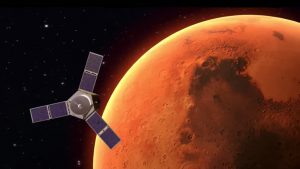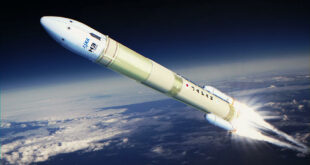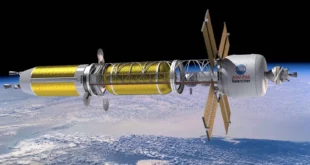
According to a 17 March 2020 report in The National, the launch of the UAE’s Mars orbiter, slated to lift off from Japan in July, is on schedule despite the Covid-19 pandemic.
The Mohammed bin Rashid Space Centre told The National that the launch date has not been changed and that the Hope Mars Mission, also known as the Emirates Mars Mission, remains on track to leave Earth from the Tanegashima Space Centre in mid-July.
Omran Sharaf, Project Manager of Emirates Mars Mission and Sarah bint Yousif Al Amiri, Minister of State for Advanced Sciences, spoke exclusively to Euronews, the first international media outlet to be allowed into the clean room, about the probe. Set to orbit the red planet later this year, the Hope Mars Mission aims to provide a better understanding about climate change, and increase human knowledge about the Martian atmosphere.
Sarah Al Amiri explained, “What the Emirates Mars mission will provide is actual data throughout an entire year, everywhere in Mars. Now why is that important? Climate change is one of the reasons that Mars has transformed and understanding better the weather dynamics and the atmospheric changes on Mars gives us one piece of the puzzle on what happened to Mars, why has it got into the state that it’s at today; and that will even allow us to better understand climate change on Earth, and what usually naturally happens when it comes to climate change.”
“So eventually, when we send humans to Mars this will provide us with a better understanding on what will be faced,” she added.
The probe will study the climate daily and through seasonal cycles, and weather in the lower atmosphere such as dust storms, as well as the weather on Mars’s different geographic areas. It will attempt to answer the scientific questions about Mars’ drastic climate changes, and in turn provide us with more knowledge and information about the climate change happening on earth.
Omran Sharaf said, “The UAE government wanted to see a big shift in the ecosystem that we have when it comes to building a creative, competitive and innovative knowledge-based economy. And it looked at space as a mean to do that and Emirates Mars mission is the catalyst for that big shift and change.”
“It’s about addressing our national challenges when it comes to water, food and energy resources. And it’s about generating knowledge that will serve humanity,” he continued.
The Hope Mission is being carried out by a team of Emirati engineers in collaboration with foreign research institutions. Scheduled to reach Mars in July 2021 to coincide with the 50th anniversary of the United Arab Emirates’ formation, reaching Mars will mean big changes for the UAE back on Earth.
Commenting on success of the mission, Al Amiri said, “That’s something unlike anything that we’ve ever dreamt or realised we can dream of working on. It’s the final countdown, we’re getting to launch in July. It’s the challenges of getting into Mars’ orbit and the exciting part is finding new findings, new science and new results.”
 SpaceWatch.Global An independent perspective on space
SpaceWatch.Global An independent perspective on space




